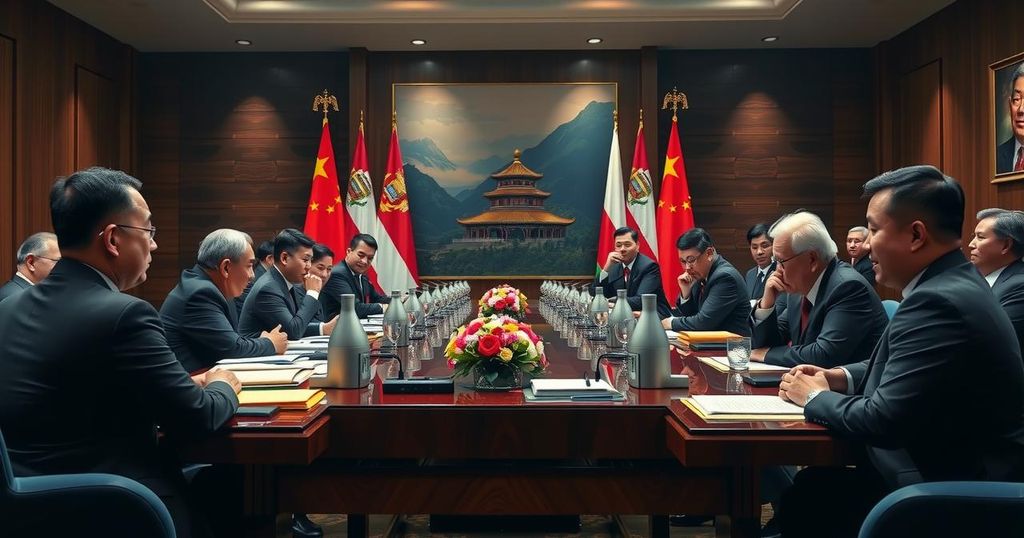The APEC summit illustrated the increasing dominance of China in Latin America, overshadowing President Biden’s presence. Xi Jinping’s leadership in infrastructure projects, including a major port in Peru, highlighted the U.S.’s waning influence, as it faces challenges in cultivating strong economic ties in the region. Additionally, diplomatic relations are complicated by varying standards of governance, as seen in Peru’s political landscape under President Boluarte.
President Joe Biden’s participation in the recent Asia-Pacific Economic Cooperation Forum (APEC) was overshadowed by the dominant presence of Chinese President Xi Jinping, who assumed a central role in the gathering. The image of Mr. Biden on the periphery of the “family photo” with world leaders captured the perception of his declining influence in a region that has historically been regarded as America’s strategic sphere. The summit underscored China’s assertive engagement in Latin America, especially in Peru, the host nation, where Xi cultivated goodwill through cultural ties and significant investments, exemplified by the inauguration of a massive $2.6 billion port project by a Chinese company. During his visit, Xi extolled the affection the Peruvian people have for China, drawing connections between the rich histories of both nations. Despite the warm rhetoric, China’s strategic engagement in Latin America, particularly through the Belt and Road Initiative, presents a formidable challenge to U.S. influence. Estimates suggest that China has invested approximately $286 billion in infrastructure across the region. In contrast, analysts suggest that the Biden administration has underperformed in fostering a robust economic partnership with Latin America, particularly regarding infrastructure development that could enhance U.S. prestige. Additionally, Mr. Biden’s decision to forgo an official photo opportunity with Peruvian President Dina Boluarte, amid her significant domestic unpopularity and ongoing corruption scandals, reflects the complexities of U.S. diplomacy in the region. While the Chinese government cultivates relationships without stringent conditions, U.S. ties often depend on shared democratic values. The contrasting approaches to diplomacy in Latin America signify a pivotal moment, as the Biden administration seeks to maintain stability in its relationship with China amidst an evolving geopolitical landscape. The engagement with Xi, emphasizing cooperation rather than conflict, indicates an understanding of the dynamics at play in a frequently competitive arena for influence. In summary, the APEC summit represented a turning point, illustrating the shifting power dynamics in Latin America and showcasing the growing influence of China under President Xi Jinping. The U.S. faces challenges in re-establishing its role while navigating the complexities of regional politics, particularly with leaders like Boluarte whose governance raises concerns about democratic integrity. As China continues to expand its commitment to infrastructure and economic ties, the U.S. must reassess its strategies to remain relevant in a rapidly changing landscape.
The Asia-Pacific Economic Cooperation Forum (APEC) serves as a platform for Pacific Rim economies to discuss and promote trade and economic policies. As geopolitical tensions rise, particularly between the United States and China, APEC has become a crucial stage for both nations to influence Latin America and demonstrate their leadership. China’s Belt and Road Initiative represents a significant part of its strategy to extend its influence through substantial investment in infrastructure projects in various countries, including Peru, which possesses valuable resources sought after by Chinese interests.
In conclusion, the 2023 APEC summit highlighted the growing prominence of China in Latin America, with President Xi’s engagements eclipsing President Biden’s influence in the region. The dynamics of U.S.-China relations, particularly in the context of economic diplomacy and the varying approaches to partnership with Latin American nations, are pivotal as each nation seeks to solidify its standing. The need for the U.S. to reassess its strategies in light of China’s aggressive outreach and the complexities of dealing with regional partners will be vital for future engagement.
Original Source: www.telegraph.co.uk







